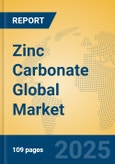Market Size and Growth Forecast
The global Zinc Carbonate market was valued at USD 0.7-1.3 billion in 2024, with an estimated CAGR of 4.0%-6.0% from 2025 to 2030, driven by demand in rubber and personal care applications.Regional Analysis
- North America is projected to grow at a CAGR of 3.8%-5.8%, with the U.S. leading due to its oil drilling and personal care sectors, focusing on high-purity zinc carbonate.
- Europe is expected to achieve a CAGR of 3.5%-5.5%, with Germany driving demand through its emphasis on sustainable catalyst applications.
- Asia Pacific is anticipated to record the highest growth at 4.5%-6.5%, led by China and India, where rubber and oil drilling industries fuel demand, with trends toward eco-friendly formulations.
- Rest of the World, particularly Brazil, is expected to grow at 3.3%-5.3%, with trends toward personal care and catalyst applications.
Application Analysis
- Rubber applications are estimated to grow at a CAGR of 4.3%-6.3%, driven by its role in compounding, with trends toward sustainable additives.
- Oil drilling applications are projected to grow at 4.0%-6.0%, valued for corrosion resistance, with innovations in drilling fluid formulations.
- Personal care applications are expected to grow at 4.5%-6.5%, used in skincare products, with trends toward UV-protective formulations.
- Catalyst applications are projected to grow at 3.8%-5.8%, critical for chemical synthesis, with advancements in high-efficiency catalysts.
- Other applications, including agriculture, are expected to grow at 3.5%-5.5%, with trends toward nutrient additives.
Key Market Players
Pan-Continental Chemical, headquartered in Taoyuan, Taiwan, produces zinc carbonate for rubber applications, known for its high-purity solutions.Brüggemann, based in Heilbronn, Germany, offers zinc carbonate for catalysts, emphasizing sustainable chemical processes.
Silox India, headquartered in Mumbai, India, provides zinc carbonate for oil drilling, focusing on cost-competitive offerings.
SAKAI CHEMICAL INDUSTRY, based in Osaka, Japan, produces zinc carbonate for personal care, emphasizing precision manufacturing.
SEIDO CHEMICAL INDUSTRY, headquartered in Tokyo, Japan, offers zinc carbonate for catalysts, known for its high-quality grades.
Rubamin, based in Vadodara, India, provides zinc carbonate for rubber, focusing on scalable production.
Diamonchem, headquartered in Seoul, South Korea, produces zinc carbonate for personal care, emphasizing innovative formulations.
Jiangxi Baohua Zinc Industry, based in Jiangxi, China, offers zinc carbonate for rubber, known for its robust production capacity.
Hengyang Kuntai Chemical Industry, headquartered in Hengyang, China, provides zinc carbonate for oil drilling, focusing on industrial applications.
Jiangxi Guangheng Gelatization Technology, based in Jiangxi, China, produces zinc carbonate for catalysts, emphasizing advanced chemical solutions.
Porter’s Five Forces Analysis
- The threat of new entrants is moderate; high production costs and regulatory barriers limit entry, but niche applications attract new players.
- The threat of substitutes is moderate; alternative compounds like calcium carbonate compete, but zinc carbonate’s unique properties maintain its edge.
- Buyer power is moderate; industrial clients negotiate pricing, but specialized applications limit leverage.
- Supplier power is low; zinc raw materials are widely available, reducing supplier influence.
- Competitive rivalry is high; players differentiate through purity, sustainability, and application-specific innovations.
Market Opportunities and Challenges
Opportunities
- Growing rubber and oil drilling industries drive demand for zinc carbonate.
- Increasing demand for eco-friendly personal care products enhances market potential.
- Emerging markets in Asia Pacific offer growth due to industrial expansion.
Challenges
- Stringent environmental regulations increase production costs.
- Fluctuating raw material prices impact profitability.
- Technical expertise requirements for high-purity grades pose challenges.
Growth Trend Analysis
The Zinc Carbonate market is growing steadily, driven by industrial and personal care demands. Hengyang Kuntai Chemical Industry currently has a zinc carbonate capacity of 2,500 tons, focusing on oil drilling applications. Jiangxi Guangheng Gelatization Technology maintains a capacity of 12,000 tons, emphasizing catalyst applications. Jiangxi Baohua Zinc Industry holds a capacity of 4,800 tons and is constructing an additional 10,000-ton project, signaling expansion in rubber and catalyst markets. These developments align with a projected CAGR of 4.0%-6.0% through 2030, reflecting the industry’s focus on sustainability and high-purity applications.This product will be delivered within 1-3 business days.
Table of Contents
Companies Mentioned
- Pan-Continental Chemical
- Brüggemann
- Silox India
- SAKAI CHEMICAL INDUSTRY
- SEIDO CHEMICAL INDUSTRY
- Rubamin
- Diamonchem
- Jiangxi Baohua Zinc Industry
- Hengyang Kuntai Chemical Industry
- Jiangxi Guangheng Gelatization Technology








